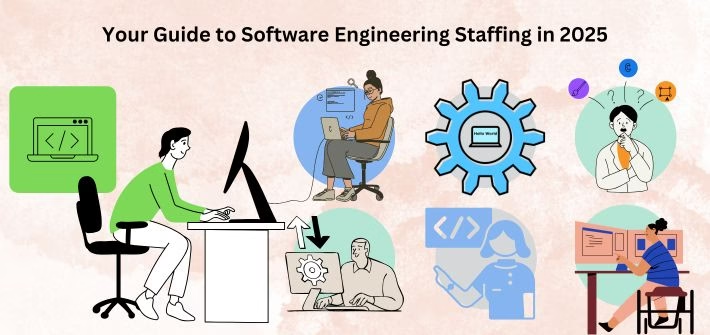Staffing software engineers in 2025 is no longer putting people in seats; it’s about precision, speed, and vision. The game has changed — not in conception, but in reality. Recruitment today is fueled by technology from five years past that finally became available, candidate expectations a decade ago would have been outrageous, and business imperatives that will not be delayed.
This isn’t an update. It’s a reinvention.
The Unraveling of the Previous Pipeline
Staffing previously was in a formulaic sequence: job posted, résumés filtered, interviews conducted, offer extended. That system exists today, yet it’s keeping teams captive that need velocity and nimbleness.
Hiring cycles are no longer linear. Companies are moving to continuous talent mapping. The idea isn’t to wait for a need — it’s to know who you’d hire before the need arises.
Fewer companies are holding screened lists of approved engineers who have shown interest in the cause, rather than the career. By the time a position becomes available, the list is prepared.
Contract Is No Longer the “Backup” Plan
Five years ago, contract engineers were typically brought in to cover shortages. Today, 2025, they’re at the core of the business model.
Project-by-project hiring has come of age. Startups and firms alike are building modular teams across product life cycles. A full-stack engineer can take over for a six-month sprint and cycle out when the product matures. That’s not patchwork — it’s strategic flexibility.
And engineers don’t fight it. To the contrary. Most welcome the liberty and concentration that stem from well-defined, finite tasks. The top contract builders aren’t seeking a permanent job — they seek meaningful speed.
Why AI Didn’t Replace Recruiters
It automated the noise, not the nuance.
Now, AI systems interview potential candidates, assess skills, and even interview technically. But the hiring process remains quite human at its final step. Culture fit, communication style, and attitude towards problem-solving still call for judgment — and judgment does not scale well by machine.
That is why human recruiters have learned to change. In 2025, they spend less time looking and more time telling: crafting how the opportunity is presented, placed, and framed. When multiple offers are extended to each engineer, messaging is everything.
Skill Over Prestige, Outcomes Over Titles
Where they graduated is no longer as important as what they’ve shipped. The resume-first approach is on the way out. What’s taking its place? Portfolios, GitHub commits, case study walkthroughs, and real-world solutioning.
This merit-driven revolution has opened doors — and raised expectations. Firms like ours want engineers who’ve shipped, tested, scaled, and made. Degrees matter less, but no longer the bottleneck.
Within, hiring groups are re-tuning their sieves. Is the job being funneled by unnecessary credential qualifications? Can one demonstrate ability in two days what a résumé can only imply in two pages?
Soft Skills Are No Longer Optional
Code is not enough. For remote and hybrid teams, the skills to write a solid update, provide useful feedback, or facilitate a Zoom sprint are as valuable as technical skill.
Engineers able to work time zones apart, asynchronously process, and communicate well are worth an absolute premium — and are being recognized as candidates for leadership. Companies are discovering (occasionally just the hard way) that even highly intelligent programmers can lead teams and a project right into the ground if they cannot work as part of a distributed team.
Hiring today means looking past hard skill fit. It means hiring for function, rather than technical fit.
The Speed Gap Is the Real Risk
Here’s the biggest difference in 2025: timing.
In-demand candidates don’t stay in the market for long. If your process takes three weeks, you’re already behind. Top engineering talent expects clarity, momentum, and professionalism — not just perks.
Companies that win in this climate have adapted their process:
- Pre-briefed hiring managers
- Clear, two-round interview structures
- Rapid follow-up
- Offers that arrive while interest is still high
Being quick isn’t about hurrying. It’s about valuing the time of applicants and showing that your business knows what it’s looking for.
Looking Ahead
Recruiting software developers in 2025 isn’t more difficult — but it is changing. Employers who will thrive won’t be those with the highest paychecks. They’ll be those who’ve changed the process of finding, interacting with, and hiring technical experts.
It’s not about seating anymore. It’s about building teams that can pivot, scale, and compound in real time. And in this economy, the best hiring plan is one that’s one step ahead of the need—powered by efficient, reliable software engineering staffing that keeps your projects moving and your goals within reach.

